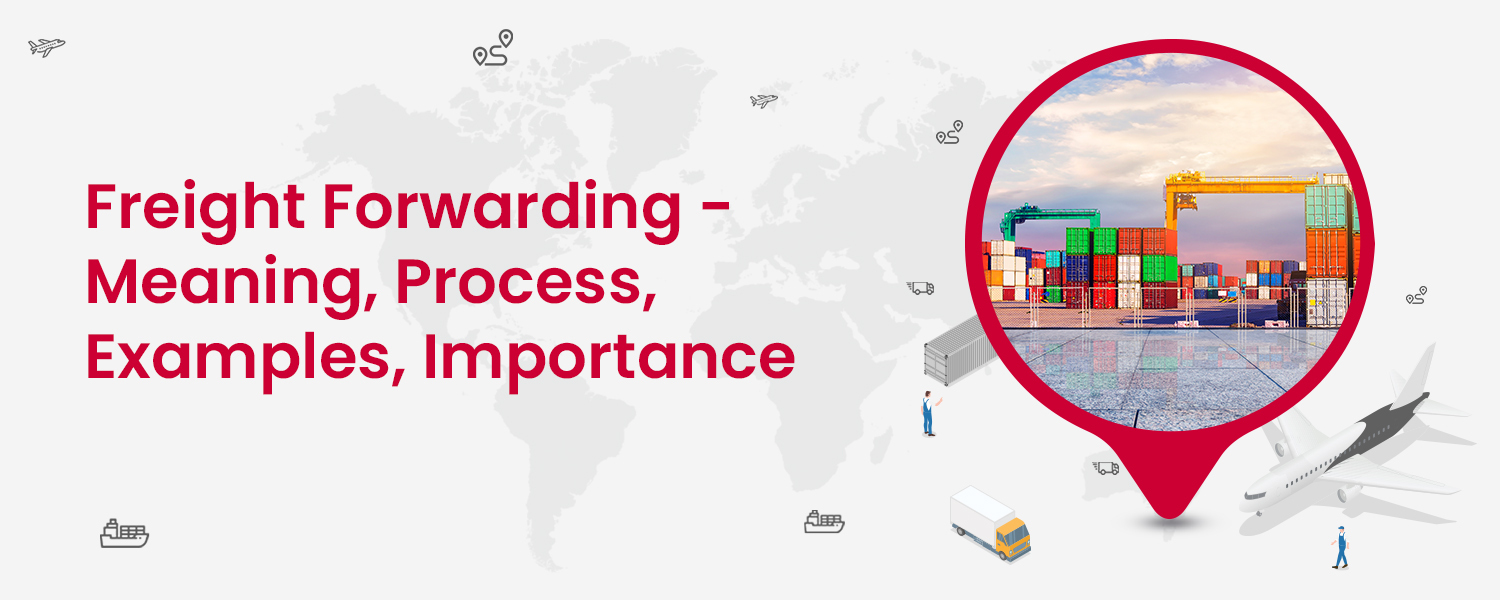Logistics and supply chain management is not an easy task. It can easily make a newbie an aberrant. But as an eCommerce seller, you can’t get away from it (and you shouldn’t). You’ve to deal with the complexity of logistics to prosper in the worldwide market. Businesses that want to serve global customers and clients require a robust logistics infrastructure to ensure the safety and timely delivery of the consignment. International shipping is critical as it has many regulations, therefore sellers should consider third-party freight forwarding companies to arrange intermodal transportation and customs clearance on behalf of the seller.
Simply defined, freight forwarding is a subset of logistics and it ensures the safe and secure delivery of products. Without a freight forwarder eCommerce sellers could face a massive logistical burden that would have a negative impact on their global expansion. In this blog, let’s unfold the freight forwarding meaning, process, and importance of freight forwarding.
What is Freight Forwarding?
Freight forwarding is a critical service in the logistics industry that helps move goods from one place to another. Simply put, a freight forwarder acts as an intermediary between a shipper (the person or company who wants to send goods) and various transportation services to ship goods.
When a shipper wants to move goods, they typically need more resources, knowledge, or time to handle all the logistics of shipping their products to international customers. This is where a freight forwarder comes in. They handle all the details of the shipment, from coordinating with different transportation providers to ensuring that customs and regulations are met. They also help to manage the cost and timing of the shipment and provide a single point of contact for the shipper to track the status of the shipment.
For example, a company in the United States wants to import a large order of products from a supplier in China. However, the company may not have the experience or resources to handle the logistics of getting the goods from China to the United States. In this case, the company would work with a freight forwarder in China. The freight forwarder would handle the logistics of getting the goods from the supplier to a port in China, then coordinate with a shipping line to get the goods loaded onto a ship and transported to the United States. Once the goods arrive in the United States, the freight forwarder in the US would take over, handling customs clearance and delivering the goods to the company’s warehouse.
Documents Required for Freight Forwarding
Several documents need to be submitted when shipping your goods through freight forwarding companies. These include:
Commercial Invoice
As an eCommerce business, you’ll want to ensure that your commercial invoice is accurate and complete. The invoice should include the names and addresses of the supplier and buyer, the itemized list of goods being shipped, the unit price, the total value of the goods, and information such as shipping line and financial institution. It’s also essential to include any discounts or special terms of sale that apply.
Bill of Lading (B/L)
A Bill of Lading is a crucial document for eCommerce businesses as it acts as proof of ownership of the goods. The exporter and importer information must be filled in, along with information such as the number of packages, list of goods, dates of arrival and departure, ports of destination and departure, and consignee and consignor names. In addition, it’s vital to ensure that the B/L is properly completed and signed by the carrier, as it will be required for customs clearance at the destination port.
Packing List
A packing list is a detailed list of the goods being shipped, and eCommerce businesses must provide an accurate packing list to the freight forwarder. It should include the quantity, weight, and dimensions of each item being shipped and any other relevant information, such as the item’s SKU or product code.
Certificate of Origin
As an eCommerce business, you’ll want to ensure that you have the correct certificate of origin for your goods. This trade document proves that the cargo shipped is processed, manufactured, and obtained in a particular country. This document is required for customs clearance and may be required to qualify for certain trade agreements or to avoid tariffs or other trade barriers. Your certificate of origin must include numbers and marks, the number of crates, boxes, or packages, net and gross weight, and a description of goods.
Dangerous Goods Declaration– if applicable
If the goods you’re shipping are considered dangerous, such as hazardous materials, chemicals, or explosives, a dangerous goods declaration is required. This document provides information on the nature and handling of dangerous goods and is used to ensure that the goods are transported safely. Therefore, it’s important for eCommerce businesses to be aware of the dangerous goods regulations and to provide the correct documentation.
Insurance Documents
As an eCommerce business, consider insuring your goods to protect them from loss or damage during transit. An insurance document is required for this purpose, and it’s important to ensure that the coverage is adequate for the value of the goods being shipped.
Letter of Credit
A letter of credit acts as an agreement between buyer and seller and provides a level of assurance to both the buyer and the seller that the payment will be made as agreed upon in the sale contract. Once the products have been shipped, the seller shows the required documents to the bank as proof that the cargo has been shipped as agreed.
The Process of Freight Forwarding
Export Haulage:
The first stage of the freight forwarding process is the export haulage. In this stage, the freight forwarder arranges for the goods to be picked up from the shipper’s location and transported to the warehouses. This step also involves the preparation of all the necessary paperwork and coordination with the carrier to ensure that the goods are loaded and secured properly on the shipping container or pallet.
Items Checkpoint:
After the goods are loaded and secured, they will be inspected by the freight forwarder. This includes checking for prohibited items, ensuring that the items are properly packaged and labelled and that the paperwork is in order.
Export Customs Clearance:
In this stage, the freight forwarder handles the customs clearance process for the goods being exported. This includes filing the necessary paperwork and submitting a declaration – Electronic Export Information (EEI) – i.e., the data detailing the cargo and other supporting documents. This is an important stage in international shipping and involves the coordination of the freight forwarder with the customs authorities to ensure that the goods are cleared for export promptly.
Import Customs Clearance:
After the goods are shipped, and they reach the destination port or airport, they will undergo the import customs clearance process. This stage is similar to the export customs clearance process, where the freight forwarder handles the necessary paperwork and ensures everything is in line. The import customs clearance is either performed by the freight forwarder, the freight forwarding company’s agent, or the customs broker.
Destination Arrival and Handling:
In this stage, the goods are offloaded from the shipping container and prepared for delivery to the forwarder’s warehouse. It also involves the inspection of the goods to ensure that they are in the same condition as when they were loaded and that there are no damages or missing items.
Import Haulage:
The final stage of the freight forwarding process is the import haulage. In this stage, the freight forwarder arranges for the goods to be transported from the port or airport to their warehouse or partner’s warehouse. This includes coordinating with the carrier to ensure the timely delivery of goods and providing the shipper with the necessary paperwork.
Importance of Freight Forwarding
Time-saving
Freight forwarders handle all the logistics of getting goods from the manufacturer or supplier to the customer or final destination, which can save a lot of time and hassle for eCommerce businesses. This can be especially beneficial for small businesses or those with limited resources and expertise, as they may not have the capability to handle all the logistics of shipping goods on their own.
Cost-effective
Freight forwarders have the knowledge and resources to find the most cost-effective shipping options for businesses. They can negotiate lower rates with shipping companies and consolidate multiple small shipments into one larger shipment, which helps save business costs. They also know the most cost-effective routes for shipping goods, which can help businesses to save on transportation costs.
Expertise in Regulations and Customs
Freight forwarders have a deep understanding of the rules and regulations of different countries, which can help ensure that shipments comply with all necessary laws and regulations. They also handle the paperwork and other documentation needed for international shipments, which can be complex for businesses to handle independently. This can help businesses to avoid costly fines and penalties for non-compliance.
Tracking and Visibility
Freight forwarders provide businesses with a single point of contact for tracking the status of the shipment. They also provide businesses with updates on the status of the shipment, which allows businesses to plan their logistics and inventory accordingly. You can also track the location and estimated time of arrival of their shipment, which helps to improve supply chain management.
What is a Freight Forwarder Responsible For?
Shipment Tracking
One of a freight forwarder’s primary responsibilities is tracking the shipment’s status and providing updates to the shipper. This includes monitoring the shipment’s progress, tracking the location of the cargo, and providing an estimated arrival time. This allows the shipper to plan their logistics and inventory accordingly.
Customs Brokerage
A freight forwarder is responsible for handling the customs clearance process for the shipped goods. This includes filing the necessary paperwork, such as the commercial invoice, bill of lading, and certificate of origin, and paying any applicable duties or taxes. They also coordinate with customs authorities to promptly ensure that the goods are cleared for export or import.
Warehousing
Some freight forwarders also offer warehousing services, where they can store the goods before or after shipment. This can be beneficial for International eCommerce sellers who need to store their goods temporarily or lack space to store them.
Negotiating
Freight forwarders are responsible for negotiating with shipping companies and carriers to secure the best rates and terms for their clients. They also negotiate with the customs authorities and other government agencies to ensure that the goods are cleared for export or import promptly.
Cargo Space Scheduling
A freight forwarder is responsible for scheduling cargo space on ships, planes, or trucks for their clients. They have to make sure that the cargo will be loaded on time and in the most cost-effective way.
Consolidating Freight
Consolidating freight is the process of combining several small shipments into one larger shipment. For example, freight forwarders have several clients who may only need part of the container to transport a shipment. Therefore they provide less than container load (LCL) shipping, where multiple small consignments are all booked aboard the same container. This helps to save costs for the shipper.
Difference Between Logistics and Freight Forwarding
Freight forwarding is a specialized service that focuses on the coordination and movement of goods from one place to another. Freight forwarders act as intermediaries between the shipper and various transportation providers, handling everything from arranging for the goods to be picked up from the origin, loaded onto a ship, truck, or aeroplane, and delivered to the destination. They also handle any necessary customs clearance and paperwork and provide the shipper with updates on the status of the shipment. They also provide value-added services such as packaging and labelling, which can help businesses to ensure that their goods are properly packaged and labelled for shipping.
On the other hand, logistics is a broader term that encompasses the entire process of planning, implementing, and controlling the movement of goods from one place to another. Logistics includes everything from sourcing raw materials and components to manufacturing and assembly warehousing and distribution to delivery to the customer. Logistics also includes other activities such as inventory management, packaging, and labelling. It also includes other activities such as supply chain management, transportation management, and distribution management, which helps businesses to optimize their operations and reduce costs.
Conclusion
Freight forwarding companies are beneficial for eCommerce businesses of all sizes. Whether you’re a new or a seasoned eCommerce seller, you must hire freight forwarders for the international shipping of goods. This will save you time, energy, and cost and minimize the risk of any potential failure. In conclusion, when choosing a freight forwarder, do not rush this decision; research each option thoroughly. NimbusPost can help you with this. Our cutting-edge platform ( Nimbus FF+) is designed to help importers and exporters compare moving rates in real-time and manage maritime shipments quickly and easily. Our advanced technology-enabled platform lets you manage the complex chain of international transport by enabling shipment booking in just a few minutes.




